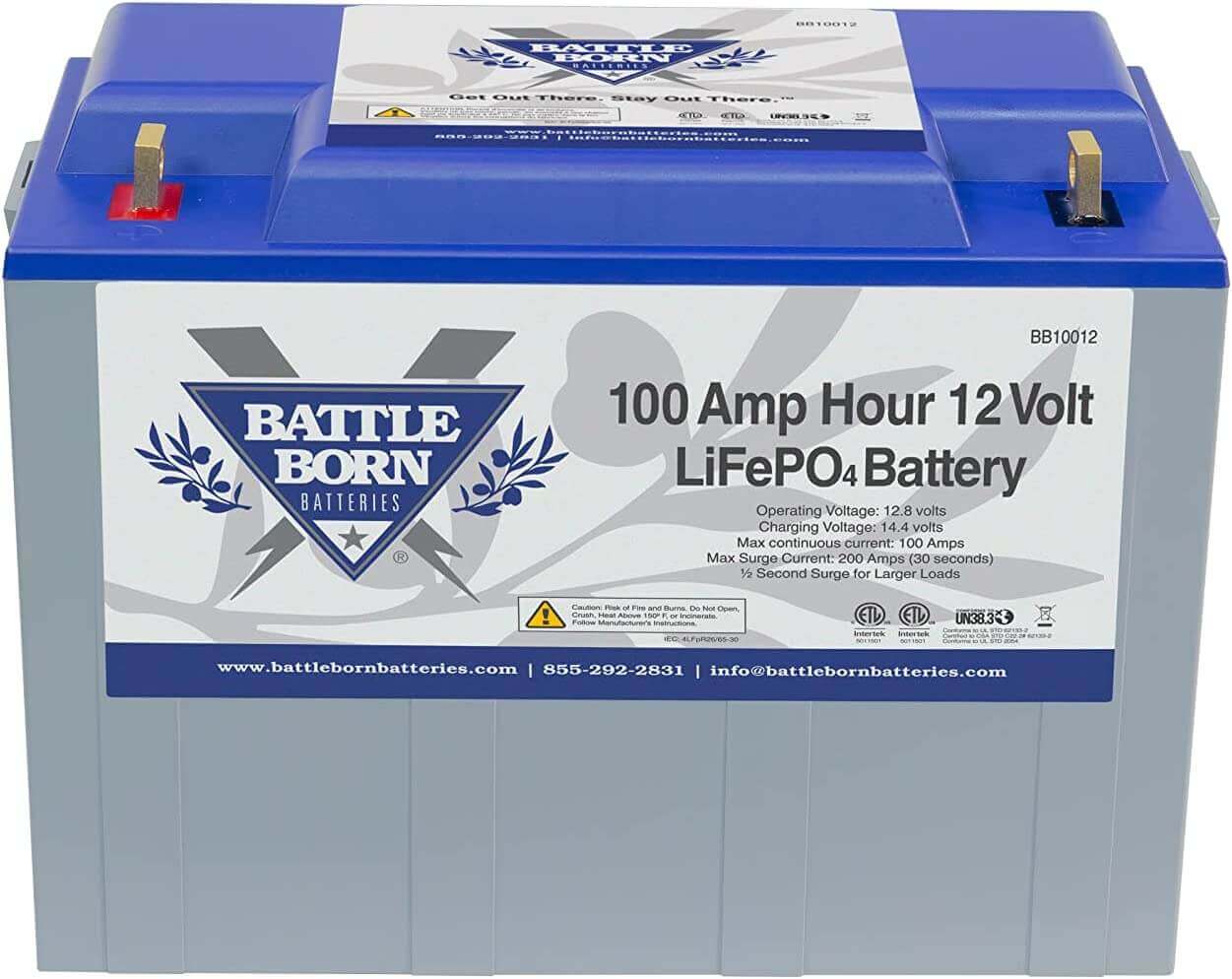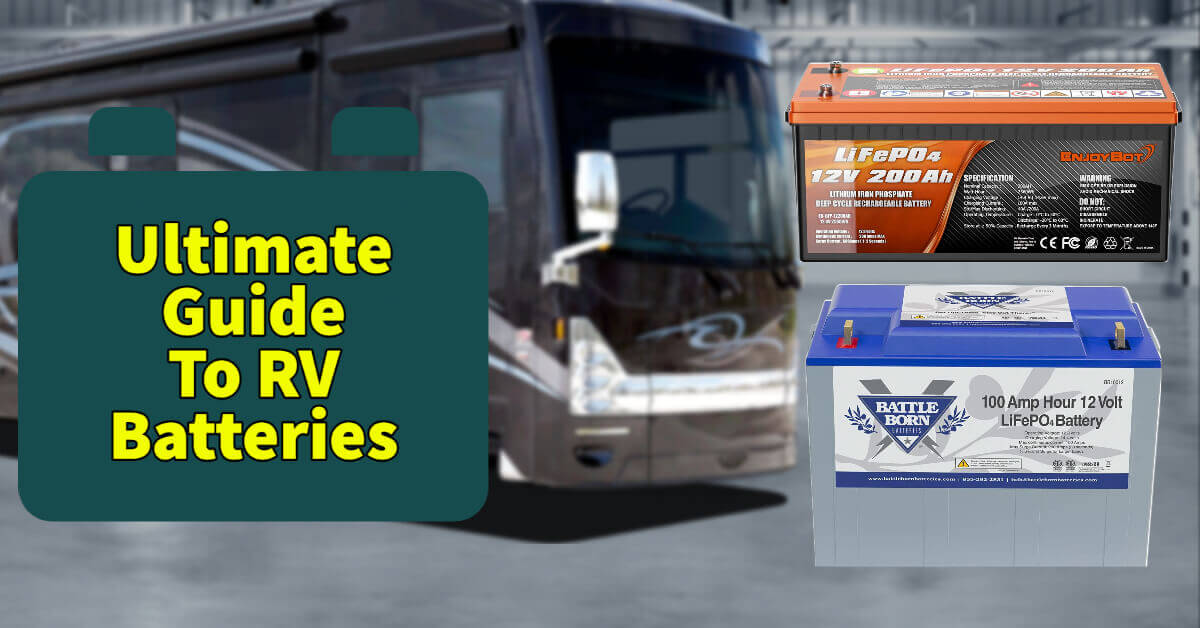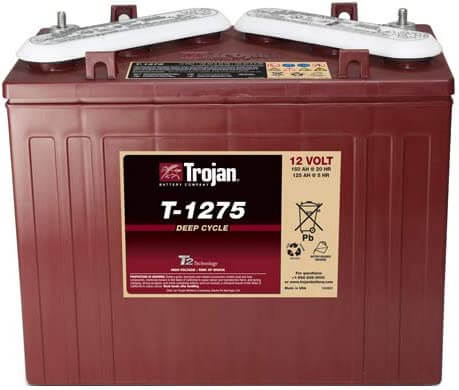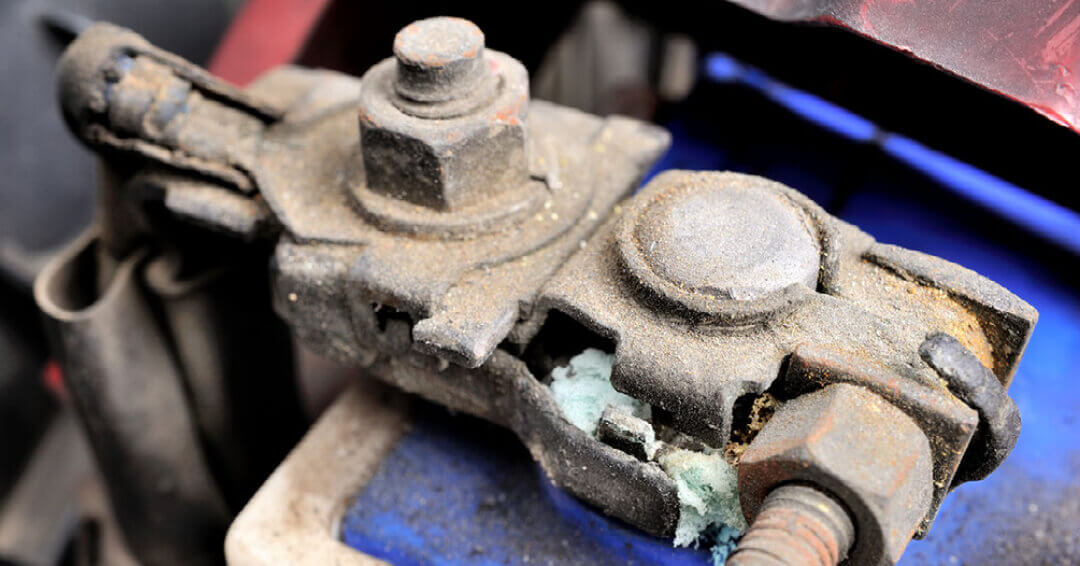- Home Page
- RVing Tips & Tricks
- Ultimate Guide to Rv Batteries
Ultimate Guide to RV Batteries
The ultimate Guide to RV batteries will provide everything you need to know to choose the right house batteries for your RV
RV house batteries are deep-cycle batteries used to power the electrical systems in recreational vehicles (RVs). They are used in conjunction with an RV's primary electrical system, which is powered by a generator or shore power. The house batteries store electrical energy that can be used when the RV is not connected to a power source. The Ultimate Guide to RV Batteries will help you choose the right house batteries for your RV.
A few different types of house batteries can be used in an RV, including flooded lead-acid batteries, sealed lead-acid batteries, and lithium-ion batteries. Each type of battery has its advantages and disadvantages; the best choice will depend on the specific needs and preferences of the owner of the RV.
Tips for choosing the right RV house battery for your needs
Ultimate Guide to RV Batteries overview of the different types of RV house batteries
A few different types of house batteries can be used in an RV, including flooded lead-acid batteries, sealed lead-acid batteries, and lithium-ion batteries. Flooded lead-acid batteries are the most common and are known for their reliability and low cost. They require regular maintenance, however, as the electrolyte levels need to be checked and topped off periodically. Sealed lead-acid batteries are similar to flooded lead-acid batteries but do not require regular maintenance. Lithium-ion batteries are a newer technology that offers many benefits, such as longer lifespan, higher energy density, and faster charging times, but they are also typically more expensive than other types of batteries.
Ultimate Guide to RV Batteries Battery Comparison
Lead-acid and lithium-ion batteries are both commonly used as RV house batteries, and each has its advantages and disadvantages. Here is a comparison of the two types of batteries:
Lead-acid batteries
Advantages: Lead-acid batteries like the Trojan Battery (Pictured Above) are generally less expensive than lithium-ion batteries, and they have a long history of use, so they are well-known and trusted by many RVers. They are also relatively low maintenance and do not require special charging or discharging rates.
Disadvantages: Lead-acid batteries have a lower energy density than lithium-ion batteries, which means they are heavier and larger for the same capacity. They also have a shorter lifespan than lithium-ion batteries, typically lasting 3-5 years with proper maintenance. They are also more sensitive to extreme temperatures and can be damaged by freezing or overheating.
Lithium-ion Batteries

Advantages: Lithium-ion batteries like the Battle Born Lithium Battery (Pictured Above) have a higher energy density than lead-acid batteries, which means they are lighter and smaller for the same capacity. They also have a longer lifespan than lead-acid batteries, typically lasting up to 10 years or more. They are also less sensitive to extreme temperatures and can be charged and discharged faster.
Disadvantages: Lithium-ion batteries are generally more expensive than lead-acid batteries, requiring a special charging system to ensure they are correctly charged. They also have a higher self-discharge rate, which means they lose their charge more quickly when not in use.
In summary: lead-acid batteries are a tried-and-true technology known for their reliability and low cost, but they have some limitations in terms of weight, size, and lifespan. Lithium-ion batteries are a newer technology that offers several benefits, such as higher energy density, longer lifespan, and faster charging times, but they are also more expensive and require a special charging system. Ultimately, the best choice for an RV house battery will depend on your specific needs and preferences.
Ultimate Guide to RV Batteries Information on RV house battery capacity, voltage, size, and weight
When selecting house batteries for your RV, you must consider their Amp-Hours rating. Amp-hours (Ah) is a measurement unit used to describe a battery's capacity. It refers to the amount of electrical energy a battery can store and is typically used to compare the capacity of different batteries. The capacity of a battery is also important because it determines how long it can power a device or system before it needs to be recharged. For example, a battery with a capacity of 100 Ah can provide 1 amp of current for 100 hours or 2 amps of current for 50 hours, and so on. The capacity you need will depend on several factors, including the size of your RV, the type of appliances and systems you are using, and how long you plan to be without access to a power source.
Choosing a battery with a higher capacity is a good idea than you think you will need to ensure that you have a sufficient reserve of power. It's also important to keep in mind that the actual capacity of a battery will decrease as the battery ages, so it's a good idea to choose a battery with a higher capacity to compensate for this loss. It's also important to keep in mind that the actual capacity of a battery will decrease as the battery ages, so it's a good idea to choose a battery with a higher capacity than you think you will need to ensure that you have a sufficient reserve of power.
Voltage: Most RVs use 12-volt electrical systems, so choosing a house battery with a voltage of 12 volts is essential. Some RVs may use a combination of 6-volt and 12-volt batteries to provide additional capacity.
Discharge Rate
The discharge rate of a battery is measured in amps, and it can be calculated by adding up the current usage of all of the devices and systems that are being powered by the battery.
For example, if you are using a 12-volt house battery to power a fridge that uses 1 amp of current and a light that uses 0.5 amps of current, the discharge rate of the battery would be 1.5 amps.
To determine the discharge rate of a battery, you will need to know the current usage of all of the devices and systems you are planning to run with the battery. This information is usually provided in the user manual or specifications for the device or system.
EXAMPLE
For example, let's say you are using a 12-volt house battery to power the following devices and systems:
Fridge: 1 amp
Lights: 0.5 amps
Water pump: 2 amps
To determine the discharge rate of the battery, you can add up the current usage of all of the devices and systems:
1 amp + 0.5 amps + 2 amps = 3.5 amps
This means that the discharge rate of the battery is 3.5 amps. The battery can provide 3.5 amps of current to simultaneously power the fridge, lights, and water pump.
It's important to note that the discharge rate of a battery can vary depending on the age and condition of the battery, as well as the temperature and other environmental factors. It's a good idea to regularly check the discharge rate of your battery to ensure that it is performing as expected and to identify any potential issues.
Size and weight: RV house batteries come in a range of sizes and weights, and it's important to choose a battery that will fit in the available space and that you can easily handle when it needs to be replaced or moved.
Ultimate Guide to RV Batteries Overall Comparison of lead-acid vs. lithium-ion batteries
Energy density
Lead-acid batteries have a lower energy density than lithium-ion batteries, which means they are
heavier and larger for the same capacity. For example, a 100 Ah lead-acid battery might weigh around 50 lbs and measure approximately 10 inches in diameter and 7 inches in height. In Comparison, a 100 Ah lithium-ion battery might weigh only 30 lbs and measure around 8 inches in diameter and 6 inches in height.
Charge and discharge rates
Lead-acid batteries can be charged and discharged slower than lithium-ion batteries. For example, a lead-acid battery can be discharged at around 50% of its capacity. A lithium-ion battery can be discharged at around 80% of its capacity. This means that a lithium-ion battery can provide power more quickly and efficiently than a lead-acid battery.
Temperature sensitivity
Lead-acid batteries are more sensitive to extreme temperatures than lithium-ion batteries. They can be damaged by freezing or overheating, and their performance can be affected by temperature changes. Lithium-ion batteries, on the other hand, are less sensitive to temperature and are more stable over a broader range of temperatures. This makes them a good choice for use in extreme climates.
Ultimate Guide to RV Batteries Summary
Lead-acid batteries are generally heavier and have a lower energy density than lithium-ion batteries, and they can be charged and discharged at a slower rate. They are also more sensitive to temperature and can be damaged by extreme temperatures. Lithium-ion batteries, on the other hand, are lighter and have a higher energy density, and they can be charged and discharged at a faster rate. They are also less sensitive to temperature and are more stable over a wider range of temperatures.
Price: The cost of RV house batteries can vary significantly, depending on the type, capacity, and brand. It's essential to consider your budget when choosing a battery. Still, it's also important to remember that a higher-quality battery may be a more cost-effective choice in the long run due to its longer lifespan.
RV
Battery Maintenance
Proper maintenance is essential to ensure that your RV house batteries last as long as possible and are always ready to provide power when needed. Here are a few tips for maintaining your RV house batteries:
Keep the battery charged: It's important to keep the batteries charged to ensure they stay in good condition. The battery should be charged regularly, either by using a generator, shore power, or a solar panel system.
Protect the battery from extreme temperatures: Extreme temperatures can be hard on RV house batteries and can shorten their lifespan. It's essential to store the battery in a cool, dry place and avoid exposure to direct sunlight or extreme cold.
Check the electrolyte levels (if using a flooded lead-acid battery): If you are using a flooded lead-acid battery, it's essential to check the electrolyte levels regularly and top them off as needed.
Clean the battery: It's a good idea to periodically clean the batteries to remove any dirt or debris that may have accumulated on them. Use a solution of baking soda and water to gently scrub the battery, being careful not to get any of the solution inside the battery cells.
Follow the manufacturer's instructions: It's essential to follow the manufacturer's instructions for use and maintenance to ensure that you take care of the battery correctly. This may include using a specific type of battery charger or following specific charging and discharging rates.
How Long Do the Batteries Last
The lifespan of RV house batteries can vary significantly depending on several factors, including the type of battery, how well it is maintained, and how it is used. In general, lead-acid batteries have a shorter lifespan than lithium-ion batteries. Flooded lead-acid batteries may last for 3-5 years with proper maintenance, while sealed lead-acid batteries may last for 4-7 years. Lithium-ion batteries can last for up to 10 years or more.
It's important to note that the lifespan of an RV house battery can be affected by many factors, including the following:
Depth of discharge: The deeper the battery is discharged, the shorter its lifespan will be. It's important to keep the depth of discharge as shallow as possible to extend the life of the batteries.
Charge and discharge rate: Batteries with higher charge and discharge rates generally have a shorter lifespan than batteries with a lower charge and discharge rate.
Temperature: Extreme temperatures can be hard on RV house batteries and can shorten their lifespan. It's very important to store the batteries in a cool, dry place and avoid exposure to direct sunlight or extreme cold.
Maintenance: Proper maintenance is key to extending the lifespan of an RV house battery. This includes keeping the battery charged, protecting it from extreme temperatures, and regularly checking the electrolyte levels (if using a flooded lead-acid battery).
The ultimate guide to RV batteries will help you choose the right batteries for your RV. Happy RVing.
How should I maintain my RV's batteries?
How should I maintain my RV's batteries?
According to the Ultimate Guide to RV Batteries you should:
- keep the battery charged: It's important to keep the battery charged to ensure it stays in good condition. The battery should be charged regularly, either by using a generator or shore power, or by using a solar panel system.
- Protect the battery from extreme temperatures: Extreme temperatures can be hard on RV house batteries and can shorten their lifespan. It's important to store the battery in a cool, dry place and to avoid exposing it to direct sunlight or extreme cold.
- Check the electrolyte levels (if using a flooded lead-acid battery): If you are using a flooded lead-acid battery, it's important to check the electrolyte levels regularly and top them off as needed.
- Clean the battery: It's a good idea to periodically clean the battery to remove any dirt or debris that may have accumulated on it. Use a solution of baking soda and water to gently scrub the battery, being careful not to get any of the solution inside the battery cells.
- Follow the manufacturer's instructions: It's important to follow the manufacturer's instructions for use and maintenance to ensure that you are taking care of the battery properly. This may include using a specific type of battery charger or following specific charging and discharging rates.
How long do RV batteries last?
How long do RV batteries last?
According to the Ultimate Guide to RV Batteries: The lifespan of an RV house battery can vary significantly depending on a number of factors, including the type of battery, how well it is maintained, and how it is used. In general, lead-acid batteries have a shorter lifespan than lithium-ion batteries. Flooded lead-acid batteries may last for 3-5 years with proper maintenance, while sealed lead-acid batteries may last for 4-7 years. Lithium-ion batteries, on the other hand, can last for up to 10 years or more.
It's important to note that the lifespan of an RV house battery can be affected by a number of factors, including the following:
- Depth of discharge: The deeper the battery is discharged, the shorter its lifespan will be. It's important to try to keep the depth of discharge as shallow as possible to extend the life of the battery.
- Charge and discharge rate: A battery with a higher charge and discharge rate will generally have a shorter lifespan than a battery with a lower charge and discharge rate.
- Temperature: Extreme temperatures can be hard on RV house batteries and can shorten their lifespan. It's important to store the battery in a cool, dry place and to avoid exposing it to direct sunlight or extreme cold.
- Maintenance: Proper maintenance is key to extending the lifespan of an RV house battery. This includes keeping the battery charged, protecting it from extreme temperatures, and regularly checking the electrolyte levels (if using a flooded lead-acid battery).







Comments
Do you have a comment on this topic? You can leave your comment in the box below.